New Beginnings: A Conversation with Hae Jung & Sue
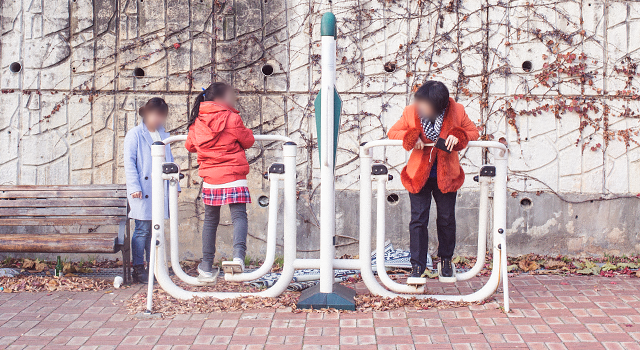
Hae Jung is very familiar with loss and grief: Her mother passed away when she was a teenager, after she grew up and got married, her husband died, and three years after that, her father starved to death. Life became unbearably difficult for Hae Jung after the death of her father. With no family left and no resources to survive on, she escaped to China in search of a better life.
Hae Jung was arrested twice during her 14 years in China, but was able to evade repatriation on both occasions. Still, she lived with constant anxiety that she would be caught and sent back, and her Chinese-born daughter, Sue, grew up fearing for her mother’s life.
Seeing the devastating effects that living in hiding had on her daughter, she escaped with Sue to South Korea. Together, they made it safely through LiNK’s networks, a journey which was funded by UT Austin's Rescue Team, just before Sue’s 8th birthday.
Now safely resettled in South Korea, Sue is attending school and Hae Jung is working as a salesperson at a mobile phone company. Hae Jung also volunteers at a local welfare center to aid people with disabilities by cooking for them and cleaning their houses and helps out at her daughter’s school as a crossing guard with other parents.
Our resettlement coordinators, Jihyun and Anna, recently met up with Hae Jung and Sue to see how they’ve been doing.
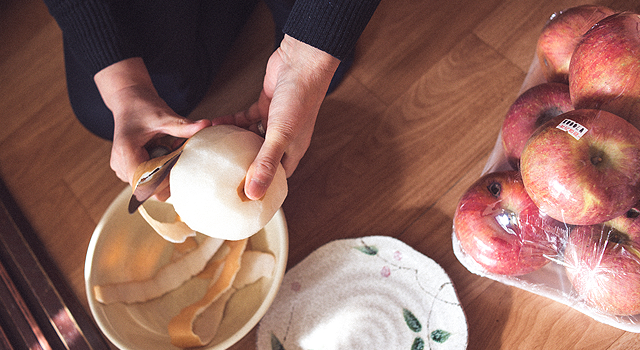
While cutting up some fruit to serve, Hae Jung began to talk about what it's been like to live in freedom...
Hae Jung: Even nowadays, more than two years after I resettled in South Korea, I still pinch myself to see if this is real—that I’m free, that I live in South Korea. Although there are difficulties here, too, especially for people like me who still don’t know a lot about this society, I always try to think that I can overcome those difficulties. If I already think it is impossible to overcome, I can never overcome anything.
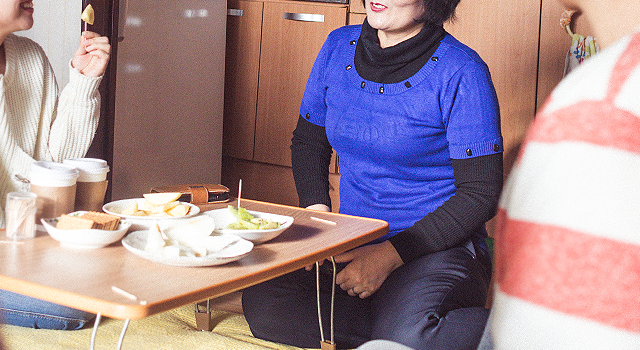
Jihyun: What advice would you give to a friend who just arrived in ROK?
Hae Jung: Try to learn as much technology as possible to facilitate your adjustment to this society (especially knowing how to use computers and the Internet is so necessary). You have to experience new things on your own instead of only listening to other people’s experiences. And, go to college if you are young enough.
No matter where you go, you will always face difficulties, conflicts with other people due to different cultures and customs. Some people will look down on you and you will make mistakes because you are not used to this society. Although South Koreans don’t have to adjust to this society the way resettled North Koreans do, they also deal with similar things in life. We are not that different. Try to find people you can open your heart to, share your struggles with, and laugh about the struggles with them.
Don’t be afraid of difficult things or interpersonal conflicts. Try to remember what you went through in North Korea, where you were not treated as human beings, then it will give you different perspectives on how to approach difficulties you may have.
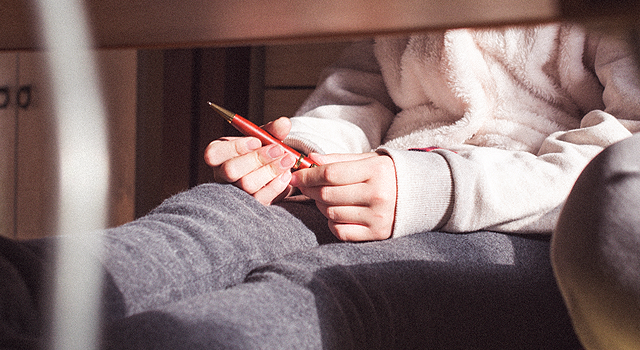
Jihyun gave Sue a wooden pen, which she was very excited to receive, with the UT Austin crest carved into it. The pen is a gift from Julian, a former member of the UT Austin Rescue Team who now interns at LiNK HQ. Hae Jung and Sue have met Julian twice in South Korea.
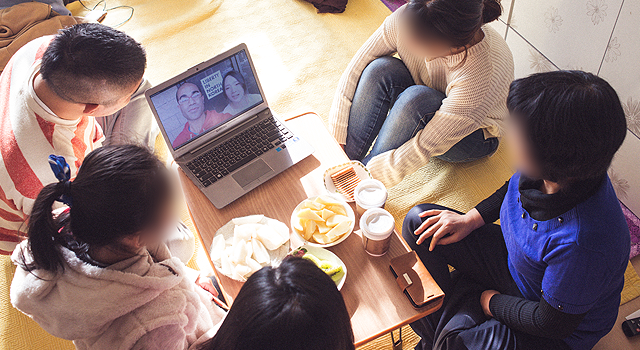
Jihyun showed Hae Jung and Sue a video of Julian saying hi and telling them about what he’s doing at LiNK HQ as an intern. Hae Jung was so happy to see Julian that she actually waved and said "Hi!” twice while watching it.
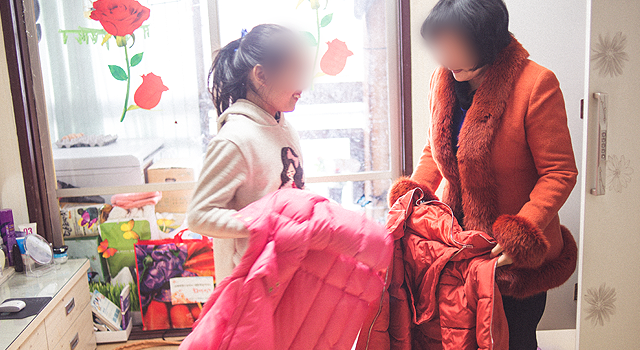
Jihyun to Sue: How do you like school these days?
Sue: It’s alway fun!
Jihyun: What is your favorite subject?
Sue: “Math”
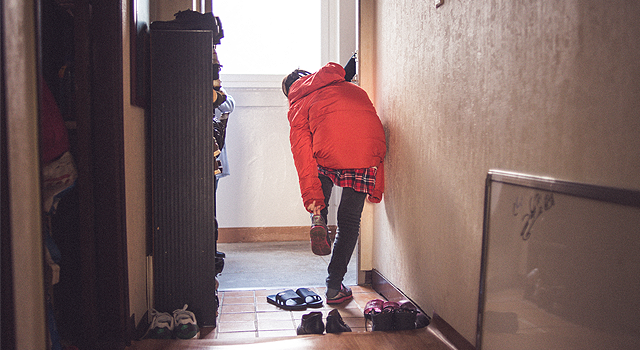
Jihyun to Sue: What are you thankful for this year?
Sue: What do you mean?
Jihyun: Well, for example, you could be thankful because you had a summer break this year, haha. You also saw Julian from the UT Austin Rescue Team again and you got to study with your tutor through our ETCE Program earlier this year. And...ah, your fractured wrist healed well and fast, too! So is there anything you are particularly thankful for, which happened this year?
Sue: “Aren’t we thankful for just the fact that we have life?”
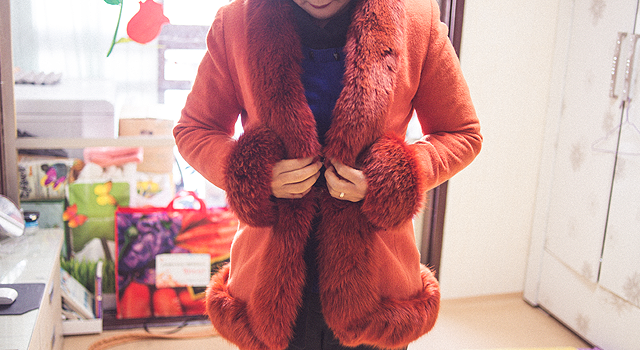
Jihyun to Hae Jung: How do you and Sue spend time together?
Hae Jung: I try to spend as much time as possible with my daughter. We often go to the park in our apartment complex to have mom and daughter time by walking and exercising together. Sometimes we do karaoke, too. When I went to karaoke with my daughter for the first time, I was surprised to see her sing and dance to a lot of South Korean pop songs. I was like, ‘when did you learn all that?’. I realized that kids adjust faster than adults. You know, she already has a South Korean accent.
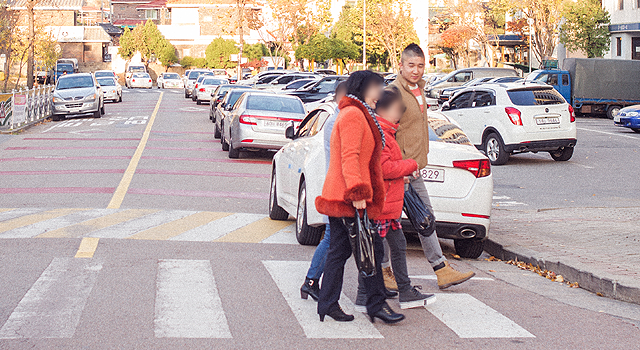
Jihyun: What kind of difficulties did you face in North Korea?
Hae Jung: Things were so difficult during the famine in the 90s, especially after the public distribution system collapsed in 1994. One time, after starving for so many days, my father and I started moving around to different towns with salt and matches to find tree roots and bark. Whenever we found tree roots and bark, we cooked them with salt and ate them. We had to do that to survive until wild, edible greens started growing in June, so we could eat the greens instead of tree roots and bark. In July and August, I got to save some greens so I could sell them at the illegal marketplaces. However, sometimes my greens even got taken away by the police whenever they cracked down on the illegal marketplaces.
Very sadly, during the famine, I lost many of my family members. I still remember the very moment when I saw my father dying of starvation while crying for corn soup and tofu that he really wanted to eat. I was also very close to starving to death. I weighed as little as 55 pounds, which was not even a half of my normal weight of 119 pounds. If my friend hadn’t brought me some kernels, I would’ve died of starvation like my father.
In order to survive during the terrible famine, the people, including myself, started eating mice, but they were so hard to catch. You might think it sounds so gross, but when you are starving for so long, your mind gets so focused on finding anything edible—and how you can skin and cook them. Whenever I caught a mouse and cooked it, it smelled strong so people living on the same block noticed the smell and could tell someone near them was cooking mouse meat. Starving kids near my house were crying because they smelled it. I tried to share the meat with those kids as much as possible, but sometimes I couldn’t because I was starving, too, and didn’t have enough to share.
Jihyun: What are some difficulties you’ve faced since resettling?
Hae Jung: When I first came to South Korea, I had a hard time understanding expressions and words that South Koreans use. Because of that, I had difficulty communicating with people at work when I was working as a caretaker and waitress.
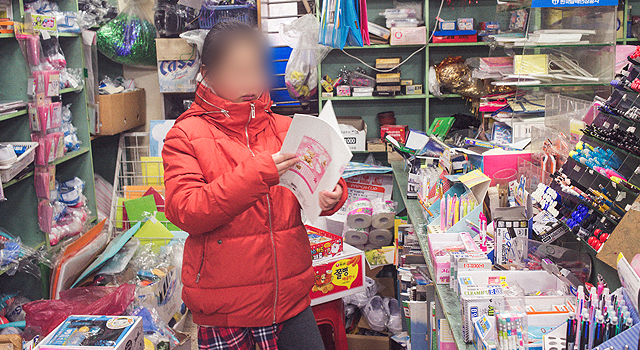
Jihyun: What is it like living in freedom in South Korea?
Hae Jung: It is very convenient thanks to more technology. Before I left North Korea in the late 90s, in my town there was only one TV in every five households and the TV had only one channel. Now in South Korea, however, every house has at least one TV and it has so many different channels. Also, almost every household has a computer and uses the Internet.
I think the Internet makes my life so much easier. If I want to listen to my favorite songs or look up information, I just have to move my fingers.
I feel so much freedom in many parts of my life. I love that people don’t bother you as long as you don’t bother them or break the law. I also think that the freedom makes people not only more equal to one another but also more friendly to each other.
I love being able to learn new things here.
When I got my ID, after coming to South Korea, I was happy. I felt like I had become a human being again (because I lived illegally in China for so long, always hiding and being afraid of getting caught). When I was in North Korea and China, I felt like I was an animal like a dog or a pig. Since I live as a human being here with freedom, I am proud of myself and even compliment myself for living like a human, which I longed for in North Korea and China.
Freedom also enables me to be healthy since I don’t have to do a lot of physically hard labor that a lot of people still do in North Korea these days due to lack of technology and infrastructure.
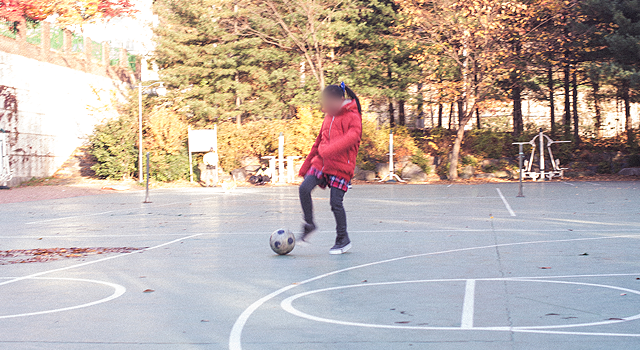
Jihyun: What hopes do you have for Sue?
Hae Jung: Of course, like any other mom in the world, I want her to be successful in life. I hope she will go to a good university, study overseas, get a good job, and prosper in many ways. I know that is just my wish. It is out of my control and it depends on how much she tries/her effort.
The most important thing for me is that Sue will grow well—healthy and happy. I want to be there for my daughter whenever she needs me. I want to be positive to her all the time so I can be a good role model and influence her to also take on a positive outlook on life.
Also I want to continue telling her to appreciate what she has and to care for others who are underprivileged and have disabilities. I want her to know that we have to give back to the society because we’ve received so much from people like LiNK’s staff and supporters.
You can help more North Korean refugees escape China and resettle in a safe country here.
A North Korean Refugee’s Legacy of Freedom | Holly & Mia’s Story
As a little girl in North Korea, I dreamt of becoming a musician. When I was 6 years old, I saw my school teacher playing the organ. After class one day, I went up and placed my hands on the keys, trying to mimic what she played. When the teacher got back, she asked who touched the organ. All the kids looked at me and I thought I’d get in trouble, but instead of punishing me, she started teaching me how to read music. Eventually, my teacher came to my home and urged my parents to send me to Pyongyang, North Korea’s capital, to pursue music with some of the country’s best musicians.

But my parents knew I could not achieve my dream. My grandfather had been a landowner before the North Korean regime took power. When the Korean War broke out, he had fled to the South, never to be heard from again. The regime didn’t forget my family’s past - to them, we were traitors. Before I was even born, my future had been decided.
I couldn’t attend a university or get a good job. While others studied, I would have to dig for coal and sell it.
One night, I was gathering firewood on a mountain near the South Korean border with another girl. In the distance, I saw a town that was dazzlingly bright in the dark evening. Electricity is a luxury in North Korea, and I soon realized I was looking across the border. I had secretly watched South Korean movies for years. I had seen the delicious food they ate and the amazing places they traveled. I stared at the lights and dreamed of what my life could be.
The dream was too powerful to ignore. I worked every day from sunrise to sunset to save money for my escape.
I gathered rare mushrooms on the slopes of North Korea’s tallest mountain, through the bitter cold. After sixty trips, I had enough money to hire a broker to help me escape into China.
But I trusted the wrong broker.
The broker betrayed us and sold us out. Soldiers were waiting for us at the meeting point and we were dragged from the river to an interrogation cell. The secret police want you to confess that you were trying to defect to South Korea. They beat you with a stick and slam your head against a wall until you just want the pain to stop. But if you confess, you’re sent to a political prison camp to die like an animal.
So I refused to say anything. They kept beating me and screaming at me, but I closed my eyes and held on to my dream of freedom. It was two weeks before they finally sent me to a detention center.

A woman in my cell told me about another broker who could help me escape. But there was a catch - I would have to be sold to a man in China.
I chose the unimaginable. I was sold for less than $3,000.
It is hard for me to talk about this time in my life. The man who bought me kept me in a small bedroom in his house. In one month, I was pregnant. When he found out, he told me to get an abortion. I refused. He tried to drug me and take me to get an abortion while I was unconscious.
One night I felt sick and thought it was food poisoning, but I was in labor and rushed to the hospital. After twenty hours, the doctor had to perform an emergency c-section. The man who bought me complained about the extra expense.
But when I woke up, there was my beautiful baby. I put her on my chest and knew she was my everything. My new dream was to give my daughter Mia a chance to have a better life than me.

I knew we couldn’t stay in China. The man who bought me didn’t want a child, and every day we stayed was another day we could get caught. But I couldn’t take a newborn baby on the dangerous journey. I waited until Mia was one year old, making secret plans with someone who could help us escape - now I know they were part of LiNK’s rescue network.
The day of our escape finally came, and we went to a safe house. I had Mia on my back and a bag full of diapers, clothes, and a small bracelet that was a gift for her. It was everything we had. We met up with other North Koreans, and they were not happy that Mia and I were joining them. I could not blame them. There were stories about groups that were caught because of a crying baby.
Taking care of a one year old is hard enough. Doing so while avoiding the Chinese police was one of the hardest things I have ever done.
I didn’t want Mia to cry so I never put her down, even when my back and arms ached from rocking her. We never stopped for more than a few hours so I had to breastfeed her along the way. Whenever we did have a break, I’d change her diapers, clean her, and make sure she ate enough. By the time I was done, we had to move again. I didn’t have time to eat so I went days with barely any food.
But every mile we traveled brought us closer to our new life. One hot morning, we climbed into a boat and crossed a river. With Mia in my arms, we were met by LiNK’s field team who welcomed us into freedom.

There are two days I will never forget. The day Mia was born and the day I arrived in the United States. I cried so much walking out of the airport. I had no idea what our new life would look like, but we were together and we were finally free.
Now when Mia falls asleep in my arms, all I feel is happiness. My story used to only be about my dreams, but now, I am watching my daughter grow into a fearless and curious person. If I never decided to escape and if I didn’t have LiNK’s help, Mia’s life would be so different. Instead of growing hungry, she has a full stomach. Instead of learning North Korean propaganda, she’s learning about science and animals and the world. Instead of fearing we could be sent to a political prison camp, I just worry she’s growing up too soon.
I believe that one day, every North Korean will be free. And every child will be able to write their own story, like my Mia.

Thanks to Holly’s bravery and the help of LiNK supporters around the world, Mia will never know a life without freedom. Holly will be leaving behind a legacy of freedom for her daughter and for generations to come.
You can help rescue more North Korean refugees and support them as they begin their new lives.




